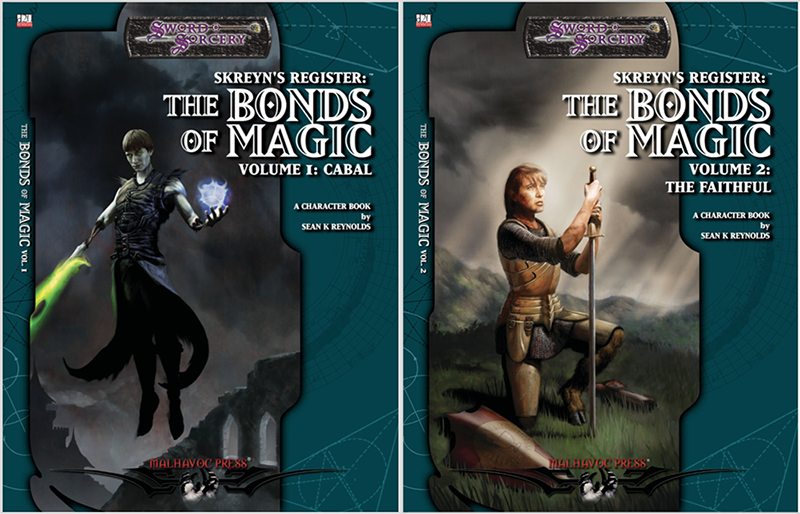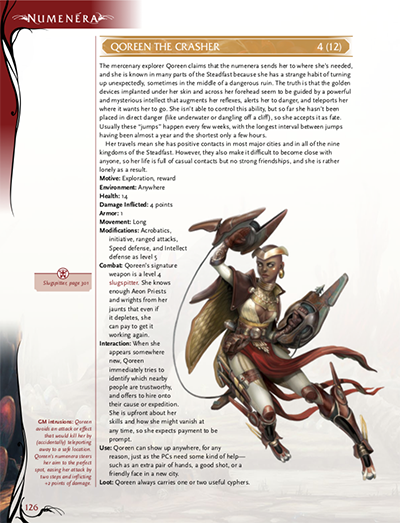1/I& #39;ve been considering converting these two 3.0/3.5 PDFs I published through Monte& #39;s previous company, Malhavoc Press. (You can get them on DriveThruRPG.) Each is 25 interconnected characters with PC and NPC stats, and each has a unique spell, feat, or magic item.
2/Percolating this idea got me thinking about the major design concept difference between 3E and the #CypherSystem and #DnD5e. (You prolly know this already, but I& #39;m talking through it for those who don& #39;t.)
3/To sum it up: 3E NPCs are built exactly like 3E PCs. If a 3E PC sorcerer7 has X skill points, a max rank of Y in Spot, and Z feats, an NPC sorcerer7 with the same stats also has X skill points, a max Spot rank of Y, and Z feats.
4/Which means it& #39;s really easy for someone to look at your NPC math and find mistakes. If I give the NPC sorcerer7 too many feats or skill points, or exceed its Spot max rank, that& #39;s an error. I can& #39;t just handwave that I want this sorcerer NPC to be great at Spot.
5/I can get around that by giving the NPC sorcerer7 a special feat or magic item or spell that allows them to boost their Spot, but I& #39;d have to write up that feat/spell/item so a potential PC could use it.
6/On the one hand, this is good because it means the designer/GM can& #39;t just throw arbitrarily-boosted NPCs at the party in order to foil PC defenses or skills. IOW, if I know the PC rogue has Stealth +20,
7/I shouldn& #39;t be able to decide that the sorcerer NPC has Spot +90 and therefore the rogue can& #39;t use stealth against them. That& #39;s GM vs player mentality, and that& #39;s not a fun RPG framework.
8/On the other hand, having to build NPCs exactly like PCs means it takes a long time to build NPCs, especially high-level NPCs, and the risk is that some part of the NPC will be "wrong" and the reader will get mad because "the designer obviously doesn& #39;t know the game."
9/Even though the "error" might be as minor as "You counted their skill points wrong, so its Spot should have been +10 instead of +11." Or even "should have been +11 instead of +10." When really, the difference between +10 and +11 isn& #39;t really significant.
10/And it creates a situation where the reader is thinking more about whether the designer added up the NPC& #39;s skill points correctly, and thinking less about how to use this NPC in their campaign.
11/And it creates goofy situations where outsiders have tons and tons of skill points, so powerful outsiders like angels have more skill points than they could ever spend, so they end up with maxed-out ranks in Acrobatics and Craft.
12/IMO, the fun of thinking about RPGs is thinking about story, not thinking about math.
13/After I left Paizo, I did development work on the #Numenera corebook. (FYI, the Numenera game system was eventually made into the setting-neutral #CypherSystem.)
14/One big change in looking at #Numenera/ #CypherSystem as compared to 3E is that NPCs are built very differently than PCs, and don& #39;t follow the same rules, because PCs and NPCs have very different roles and uses in the game.
15/Other RPGs do this too, of course, including #DnD5E, which I became aware of when I was working at Wizards again in 2015-2016, and more so when I started working on #ArcanaOfTheAncients, which converts #Numenera& #39;s science-fantasy stuff 5E-compatible stuff.
16/So I could have a sorcerer-type NPC that doesn& #39;t have any special abilities that a sorcerer-type PC has, or has an ability that an equivalent PC wouldn& #39;t have until at a higher level. Frex, my NPC might have a 100-ft-teleport at 1st level, because it& #39;s important to the story.
17/And it& #39;s okay for NPCs to do things that PCs can& #39;t do, or to have abilities that would be way too good in the hands of PCs. To repeat: THAT& #39;S OKAY. NPCs aren& #39;t PCs.
18/And of course the GM& #39;s or designers goal is to create interesting NPCs that serve an important purpose in the story. The goal isn& #39;t to show how much cooler your NPCs are than the PCS (the GM has unlimited resources to make NPCs better than PCs, but that& #39;s not what we do).
19/But if I want a low-level Nightcrawler-themed NPC villain to be able to teleport, I should be able to do that without give them a magic item or enough levels to have access to the Dimension Door spell like a PC would. (Or if I want them to have multiple teleports per day.)
20/And speaking of magic items, allocating magic items to NPCs is a huge kerfuffle in 3E, I& #39;ve done YouTube videos about it. Short version: NPCs get way less magical gear than PCs because otherwise killing one NPC foe adds a huge amount of magical treasure to the PC party.
21/So 3E NPCs get about 1/3 as much gear as 3E PCs do of the same level. Which means magical treasure from an NPC is usually inferior to what the PCs already have, unless the GM dumps all of the NPC& #39;s treasure into one good item.
22/And dumping all of an NPC& #39;s treasure into one good item means the NPC usually falls short in its stats for armor, resist rolls (saving throws), and so on. So the NPC is struggling to be a real threat at its challenge rating, especially compared to a regular monster.
23/We don& #39;t have to worry about that in #CypherSystem or #DnD5E because NPCs don& #39;t have to be built using the PC rules. Frex, the 5E MM has stat blocks for archmage, assassin, berserker, and druid. None of them have class levels, just stats appropriate to their challenge rating.
24/And #CypherSystem is even more streamlined because you can sum up a creature (monster or NPC) with one stat, its level. So if I need a gang of mook barbarians for a fight, I can say "Barbarians: level 3." Or a helper sorcerer for the wizard boss: "Sorcerer: level 4."
25/Of course, I can expand upon on or modify any aspect of that NPC to make them more specific and interesting, like "Sorcerer: level 4, spell attacks as level 5, resists drugs and poisons as level 3."
26/Or give them a full writeup with lots of info, like this NPC from the Ninth World Bestiary 3 from @montecookgames:
27/I& #39;m rambling on about this because not having to build NPCs like PCs means I as the designer can spend more time thinking about how this character can be interesting in the adventure/setting/etc instead of worrying about whether I got the math right.
28/And that& #39;s not to say that there isn& #39;t important math in #CypherSystem or #DnD5E. Frex, there are parameters for appropriate challenges against PCs, and 5E is very clear on high and low thresholds for a creature& #39;s hit points, damage per round, etc. for its level.
29/But I no longer have to worry "Did I spend all of this NPC& #39;s 40 skill points correctly? Do they really have 40 points instead of 38 or 42?" And so on.
30/So in looking at the NPCs from my Cabal and Faithful PDFs, it& #39;s really amazing to see what stuff would go away (because it& #39;s irrelevant) if converted them to #CypherSystem or #DnD5E.
31/Heck, there& #39;s stuff in the stat block that is called out (like an elf& #39;s bonus to Listen and Spot) even though the math of it is already included in the Listen and Spot stats… the stat because the designer has to let the reader know that they didn& #39;t forget those things.
32/And I mean literally the stat block says "they get +2 to Listen and Spot because they& #39;re an elf, and that& #39;s already included in their Listen and Spot bonuses."
33/Note that this thread is not a knock on 3E. I learned a lot from writing for it and from interacting with the designers, especially @montejcook and @jonathanmtweet. A lot of my thoughts on design are reactions to things I liked/didn& #39;t like in 3E. Tastes change over time.
34/Anyway, I& #39;m really strongly thinking about doing an official conversion of these 50 NPCs. If anything, it& #39;ll be some good practice for when we start to convert the #Ptolus setting to #CypherSystem and #Dnd5E!

 Read on Twitter
Read on Twitter



